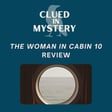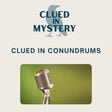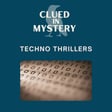Become a Creator today!Start creating today - Share your story with the world!
Start for free
00:00:00
00:00:01

Co-authored Mysteries (part 2) with Midge Raymond and John Yunker
This week, Brook and Sarah are joined by husband and wife co-authors Midge Raymond and John Yunker to discuss their experience as co-authors and mystery fans.
Discussed
Devil's Island (2024) Midge Raymond and John Yunker
The Rosie Project (2013) Graeme Simsion
Two Steps Forward (2017) Anne Buist and Graeme Simsion
The Glass House (2024) Anne Buist and Graeme Simsion
About Midge and John
For more information
Instagram: @cluedinmystery
Contact us: hello@cluedinmystery.com
Music: Signs To Nowhere by Shane Ivers – www.silvermansound.com
Sign up for our newsletter: https://cluedinmystery.com/clued-in-chronicle/
Join the Clued in Cartel for as little as $12 USD/year: https://cluedinmystery.com/clued-in-cartel/
Transcript
Transcript
Introduction of Guests and Their Backgrounds
00:00:12
Speaker
Welcome to Clued in Mystery. I'm Sarah. And I'm Brooke and we both love mystery. Hi Brooke. Hi Sarah, it's our first interview episode of the season and today we have not one guest but two. Midge Raymond and John Juncker are joining us today to talk about co-writing their brand new mystery thriller, Devil's Island. Would you like to introduce Midge and then I'll introduce John.
00:00:41
Speaker
Wonderful. Midge Raymond is the author of My Last Continent, the short story collection for Getting English, and with co-author John Juncker, the mystery novel Devil's Island. Midge has taught at Boston University, Boston's Grub Street Writers, Seattle's Hugo House, and San Diego Writers Inc. She lives in the Pacific Northwest, where she is co-founder of the boutique publisher Ashland Creek Press.
00:01:05
Speaker
John Yunker writes short stories, plays, and novels focused on the complex and often conflicted relationships between humans and animals. He's author of the novels The Tourist Trail and Where Oceans Hide Their Dead. He's co-founder with Midge Raymond of Ashland Creek Press, a publisher devoted to environmental and animal literature. Welcome to you both. We're really excited to talk about this topic with you today.
00:01:33
Speaker
Thank you so much. We're excited to talk with you as well. Thank you for having us. Absolutely.
Inspiration for Devil's Island
00:01:39
Speaker
So what made you decide to co-author a mystery thriller together?
00:01:46
Speaker
Well, John and I got the idea for Devil's Island when we were traveling in Tasmania, actually, and it was such an inspiring place. What happened was we ended up on a journey which was very similar to the one the characters embark on in the novel. It was a four-day hiking and camping trip on a tiny island off the coast of the island state, Tasmania, off the island of Australia. So it was a very remote place and um the inspiration was partly that i that idea of being so isolated and what would happen if our travel companions weren't actually as wonderful as they were because they were all great and our guides were wonderful. But it was also inspired by the Tasmanian devils because
00:02:33
Speaker
The fictional island, Marbury Island, is actually based on a real place called Mariah Island, and this is a place where the endangered Tasmanian devils are being resettled.
00:02:45
Speaker
in a place where they have no disease. Because on mainland Tasmania, they're all suffering from a facial tumor disease, which is contagious. So up to 90% of their population um has been decimated in the mainland. So Marlboro Island is a place where they can be um you know brought and um relocated. And so they bring healthy devils to Mariah Island. And they're thriving there and becoming and being grown up you know They grow up healthy, and um they're doing really well. So we thought that was really inspiring. And the devils, we never saw them, but we could hear them at night. That's fascinating. And I love that you, as a couple of authors, your minds immediately started going to, hmm, what if this trip turned bad? I think that that's like such a natural thing for um authors to start doing, or or or to you know extrapolating a story out of it.
00:03:41
Speaker
That's so absolutely true. It's just funny because, you know, everyone's probably will be driving, you know, and there's something on the side of the freeway and John will be like, oh, someone lost something off their truck. And I said, well, I wonder if their body parts it or so for me it always goes to work kind of dark. I think it kind of scares John a little bit.
00:03:58
Speaker
A little bit. We have a running joke about that at my house too. who i My ah husband is not an author and so he gets a little worried when I'm always assuming the rolled up piece of carpet has the dead body in it. I know there's nothing wrong with us, Brooke. Not at all. Not at all.
The Writing Process and Partnership
00:04:21
Speaker
So there are many different ways for co-authors to work together on a story. Can you share a little bit about your process? Sure. You know it is um you could say we've been collaborators informally for many years. We're both writers. We edit each other's work. and We've, I think, learned over the years where where our strengths and weaknesses are. And with this book,
00:04:50
Speaker
We both wrote the entire book, but we did it in chapters. So I would i would start the chapter and then i'd hand it to Midge, and then she would do her magic and hand it back. And it's pretty much like a tennis match, just back and forth and back and forth. um We had a loose outline.
00:05:07
Speaker
ah we you know Much like the travelers in the in the novel, we we knew where we wanted to end up. But we quite honestly, we only knew about you know halfway. We had it plotted roughly halfway. We didn't quite know how it would end, which made it exciting, which often led to some lively discussions, I'd say, when we hit little roadblocks along the way. But generally, it worked really well. And I have to say,
00:05:32
Speaker
ah individually, we take a lot longer to write a book than we work, than we do so collectively, because I think we kind of push each other ah they're along. And we also take over the areas that like i i love I love staring at a blank page. I have no problem with that. Midge hates that. Whereas I hate revisionism.
00:05:53
Speaker
with with a passion of a thousand sons. I'm not good at it and I can really get bogged down in revision where Midge is just, she's amazing at it. So I think combined it worked really well.
00:06:05
Speaker
It sounds like you guys really complement each other. So, I mean, you guys are business partners. You guys are married. You're writing together. How does that work in terms of your relationship? Brooke and I have spoken about other co-authors, and I'm just curious about that. Tension, or if there's any tension.
00:06:26
Speaker
No, it's it's a good question. it's I mean, you know, I would say this came up the other day, someone asked that. And what I neglected to say is if if we're, I think we're older, we are older, objectively older, but early in the relationship, I don't know if I i would have worked as well. Certainly for me, I had much more ego.
00:06:46
Speaker
ah um and I was much more sensitive to criticism than I am now. um I think we've we've just learned to work well with each other. I think where we share the vision for the book, and we know we're both on the same page, it works really well, but occasionally we have moments where we see a character differently and we we have to hash that out. but Yeah, I'd say time has helped, definitely. I don't think we could have done this in our 20s, but I think we're at a good spot now where we could. At least I couldn't have done it in my 20s. I was much more bullheaded and and just defensive. you know Collaboration can be challenging, and and I think i've think we've hit a good spot now where it works really well. Midge might disagree, of course. but
00:07:32
Speaker
yeah No, I think you're right. I think the wisdom of old age helps a lot. um And I do remember we met in graduate school, John and I, and John had a professor um ah back then who he was working on with his scripts, his screenplays. um And his professor had said, never show your work to your spouse. And it had broken up his own first marriage. And so John was reluctant to to show me his work back then.
00:08:00
Speaker
And I remember eventually he realized I could be of some help. And so he started doing that and realized I could be of some help. And I always thought he was of some help. I'm one of these people, as John was saying, i like I like revision. I like being edited. I like getting that input. Whether I'm going to take the advice or not, it's always good to have it. So gradually over the years of reading one another's work, you know we were able to collaborate pretty seamlessly because we've been doing that for so long.
00:08:25
Speaker
That's great. I'm thinking of maybe the other end of things. Like I know how I feel when things are just really popping and like, I almost can't take myself away from the desk because I'm really invested in a story. Do you guys have like, okay, it's five o'clock. We're not going to talk about the story. Like, how do you draw the end of the
Work-Life Balance and Flexibility
00:08:46
Speaker
work day? Because I could just see you guys like up all night, you know, talking about ideas of the story and never really getting, getting a break from it.
00:08:58
Speaker
I think that's true. We don't really have nine to five days, but that's the fun of it for us. you know we we We do try to make it fun. we While we've been promoting Devil's Island, we've we've had to have a lot of meetings you know to sit down and hash out do you know what we're going to do, where we're going to go, how do we get the word out. So we we go to happy hours. We take ourselves out for a drink and talk about these things.
00:09:22
Speaker
and make it fun. But we also, yeah, it's kind of a constant conversation, but we love that. And it's the same with Ashland Creek Press. There's always something going on and it's a seven day a week sort of thing. But since we enjoy it, it's not, it doesn't feel like work. That's great. Are there other writing teams that have inspired you to, um, to take on this challenge?
00:09:49
Speaker
I recently wrote a piece that appears on Jane Friedman's blog at JaneFriedman.com and it was about co-writing because I was, after John and I had done it, I was eager to see you know how other people do it and talk to a couple of writers. And one writing team in particular that inspires us is a couple that we know in Australia. ah Graham Simpson, who is best known for the Rosie books, the Rosie Project.
00:10:12
Speaker
being his first bestselling novel, and his partner, Anne Buist, who writes her own books. But they teamed up together and wrote a book called Two Steps Forward about a couple who met on the Camino in Europe and traveled together. And then they wrote a sequel to that. And now they're working on another series. The first book was called The Glass House. And they Similarly, when I talked to them for the novel, I realized similarly, they have the same sort of idea. like It actually sort of enhances their relationship because they have this thing in common that they're passionate about. They they talk about it over wine time. so They were a big inspiration just seeing how they you know do it well and do it together and really kind of thrive as a writing couple. and In the article, I i interviewed another couple,
00:10:59
Speaker
I married a couple, two women who write mysteries together and I thought that was really fun. And they talked about the, you know, some of the issues that come up, like all of a sudden they're going back and forth with their pages and a dead body or no, what was it? Someone got locked into a room with no way out and they're like, wait a minute, we have to figure this out. And I could totally relate to that as well. You also write independently. How did that work influence this project?
00:11:25
Speaker
That's a good question. You know, I think you do have to carve out space for your own work. um And a lot of it was, ah the the timing was right. But, you know, Midge has a novel coming out in December. The sort of the key is, but you know, balancing just windows of opportunity and and making sure that we're not, you know, overbooking ourselves. It's more of an issue for Midge lately with her novel. But yeah, that's that's a good question. Also,
00:11:52
Speaker
Also important not to ask, you know, put too many burdens on on one another if they've got other other commitments. So definitely a key requirement of collaboration.
Genre Exploration and Future Projects
00:12:03
Speaker
Have you or would you ever consider writing together in another genre or are mysteries the space that you want to collaborate in?
00:12:12
Speaker
I would be open to writing in any genre, actually. um We surprised ourselves by writing a mystery, I think. it was just It was the idea that came first and the realization that we we just had to write this book. And it turned out to be a mystery. But i think I think we could write together in any genre. But mystery is so much fun. And we really enjoyed it. Our next collaboration will be a mystery as well. So I think we're going to be doing that for a while. But definitely, I would be open to to another genre. How about a romance novel, John?
00:12:41
Speaker
Uh, yeah.
00:12:48
Speaker
No, I'm open to any genre as well. and So you mentioned, um, working on another, that are you currently working on another mystery and is it, uh, are we going to see some of the same characters that we saw in Devil's Island?
00:13:04
Speaker
The other mystery, and actually we've we've completed it, it's ah it's a different characters, different story. It's set in Southern California, ah tentatively called Fire Season. and um but But as for Devil's Island, we did leave the door open for a sequel, which we haven't yet tackled because we've got other ideas. and We actually are working on yet another novel set in the north of here. We're in Oregon, so it's up in the islands off the coast of Washington. so Yeah, I think we have more more ideas than time. I think that's the issue for us right now.
00:13:43
Speaker
Well, we know how that goes, don't we, Sarah? So you mentioned that you went on a trip very similarly to the characters in Devil's Island, which is a fantastic book, by the way. i It was one of those that I stayed up way too late reading as I was ah working my way through it. um And also you said that your travel mates were lovely, but where did you get your ideas for the characters? how did you know What inspiration did you have to create those characters that then had a lot of conflict and a lot of secrets?
00:14:18
Speaker
Wow. Yeah. where Where did the characters come from? you know Some of them, they and they weren't really based on the people we were there with, but a few of them were based on people we've met along the way on other trips, on other journeys. and So there's definitely that. I mean, there's definitely um a mix of voices from people that we've encountered together in the past that have stuck with us, if you will. And so we would say for for for Brooke or Jane, we would to help us you develop this character, we would say, oh, this the person's kind of reminding me of so-and-so that we met there. and And that really helped, actually, I think, for Midge and I to really say, oh, yeah. And sometimes we'd lift dialogue or rework dialogue. But it it helped us channel the voice and develop the voice and into this living, breathing,
00:15:13
Speaker
fictional character that could live and stand and walk on their own and and actually surprise us because a few of these characters did surprise us as we were working our way through this this figurative journey in the book.
00:15:26
Speaker
I think that's a real benefit that you have of being partners in life already because, you know, Sarah and I writing together, we don't have, although we're friends, we don't have a lot of shared relationships or shared experiences, but that, how fun to be able to say, remember that guy on the train, like he is such, was such a character and you guys both have that, you know, shared memory to work from. So that's amazing.
00:15:56
Speaker
Yeah, no, for sure. Yeah, we are very lucky that way. And I might also just add that the travel has a way of bringing out people's best and worst behaviors depending on the person.
Impact of Travel on Writing
00:16:07
Speaker
So you really do see you know some people are just trying to you know put up a ah good front and just be accommodating and be lovely. And other people, you you just see who they are in a heartbeat. you know because And then especially when you have something that like Devil's Island in which things go badly wrong pretty much from the beginning, you know the bad behavior kind of starts to come out for pretty much everyone. So that was kind of fun to play with too.
00:16:37
Speaker
Brooke and I have talked about co-authors and one of the things that Brooke and I talked about is the different approaches that co-authors can take. um You know, you guys kind of pass the manuscript back and forth. There's some that ah one author will create the outline, the other will kind of run with the story.
00:17:01
Speaker
um I think regardless of whatever approach authors take, what kind of advice would you offer to writers who are considering a collaboration?
Advice for Collaborative Writing
00:17:12
Speaker
That's a great question. I think for John and me, it was pretty seamless, as as we've mentioned. you know We know each other really well, and we've collaborated in other ways, and so we know how we work. But I think the first thing you'd want to do is is sit down and figure out um how you want the process to go, kind of who does what, which is very simple. But another thing that's important is to consider what each other's strengths are and weak spots are because as John had mentioned earlier, he's good with um
00:17:42
Speaker
facing the blank page and coming up with an idea and creating a character. And I like to, you know, further develop the characters and help with the plot and stuff like that. But the blank page drives me crazy. So we work really well in that respect because I don't have to look at a big page. He gives me something and then he doesn't like to revise so I can do that part of it. So um addressing one another's strengths and weaknesses is really good.
00:18:06
Speaker
Because if you identify that, you can divide and conquer a little more easily. And then you don't get the competitiveness. you know you know If John was fussy about grammar, it would might drive me a little crazy because you know I like to punctuate a certain way and you know and I'm fussy about language, whereas um he that can't be bothered. So it's great. like That's not a problem for us. But I know that with a lot of writers, you know if you're both really into the same thing,
00:18:32
Speaker
It can be competitive and that's one thing that can get in the way. So, dividing and conquering is important, I think, based on what each of you does best. And and I would add that you know if you're if you're new to it, maybe you don't try to tackle a novel. Try a short story. yeah See if it works. It's a nice trial run, so to speak. so you can ah not set the the bar so high, do a mystery short story together and see how it works, see how you know what what you learned during the process. And then you can get a little, see a story to completion and and see how it feels. and And if it works well, just then then tackle the novel because novels are tough. I don't care how many people are involved in writing one. i just feel they there're They're big projects, obviously.
00:19:23
Speaker
You never know if you're going to finish it or if you do finish it, if it's going to be something you respect. So sometimes starting small and and and it could be like it could be very mil well be a treatment for the novel. You know, you have a few characters in mind, let's but play with them and and play with a core scene in the novel and and see how it works. Yeah. I love both of those pieces of advice. Very valuable.
00:19:51
Speaker
Can you tell us how your collaboration's going so far? Yes, um we have officially finished our first draft. Yeah, our um our subscribers are, ah we've done the very scary process of serializing our first draft and giving it out to our subscribers so that they can follow along.
00:20:12
Speaker
um And yeah, but we have reached the end of draft one and now it's time to revise and find all the places that need to be patched together and make the storyline ah work and enhance characters, all the things that happen on that revision.
00:20:33
Speaker
Congratulations. What would your advice be for co-authors? Because you're you're coming from a different perspective. you know John and I see each other 24-7, and I think that makes it you know harder in some ways, but a lot easier in other ways. But what about people who, yeah, are in different locales who are working together?
00:20:53
Speaker
This is a good question. I don't think I've given it much thought. i mean i i think you know Brooke and I um started out by just bouncing ideas off of each other and and ah kind of landed on where we thought we wanted to start.
00:21:09
Speaker
And I think it my advice to people would be just be open to seeing where the story goes. Right. Because it's not just my story. It's our story. And I can't possess it. And I didn't want like I i i never felt like I wanted to write. It was really easy to say like, oh, yeah, that's an excellent idea. We should totally do that. So I think just being really open to that.
00:21:37
Speaker
Yeah, I would agree. And um also, you know, living up to, as you said, at the, your advice was to like, decide who was going to do what or, you know, what your schedule is going to be and really living up to that, you know, and I think the accountability is great because If Sarah has, she has tended in on this project to write a lot in the evenings. And if I get up in the morning and I, I'm always excited to see what she's written, but then that's, you know, accountability for me, like, well, now it's time for me to do my part. And so I appreciate what you said, John, like we did write this. I know we drafted this book much faster than I draft one of my own. And I think it is that accountability and there your partner's keeping the ball rolling and and you keep that momentum up.
00:22:22
Speaker
um really, really well with ah with a partner.
00:22:30
Speaker
I agree. that is That is definitely one of the best parts of it is, again, having you know getting excited to see what they've come up with and also just knowing someone's waiting for the next chapter.
00:22:42
Speaker
And I love what you said as well, Sarah, about letting go of something. I think that's important too, because it's not just your baby. you know It's a shared project. And I think that i did I did have moments where I was just like, you know what?
00:22:56
Speaker
John knows what he's talking about. Let's just go with this and, you know, not to be stubborn about anything. So yeah, it's really good advice. I thought it was interesting that it was much easier for me to do that in this shared project than in my own projects, right? Where I feel a little bit more protective of them.
00:23:17
Speaker
I know exactly what you mean because if John and I are talking about one of my projects, I feel possessive about it because it's my book. But if we're out together on a project, I'm much more like, oh yeah, let's just go with this you know um because it's a shared vision. And yeah, even if his advice is exactly the same, it's kind of funny.
00:23:37
Speaker
Exactly. I feel that this project that Sarah and I have embarked on has really, uh, probably made me a better writer all the way around and in ways that I didn't expect. Like that wasn't a fallout that I was, uh, you know, expecting to experience, but I definitely think that it's strengthened me in the way that I think about story and, um, just a lot of different ways. And I'm sure that you two have experienced that in your collaborations as well.
00:24:07
Speaker
Well, Midge, John, where can our listeners find you? We are at www.midgeandjohn.com. And we're also at johnyunker.com and MidgeRaymond.com. But all the information about Devil's Island and a couple of social media links can be found at MidgeAndJohn.com. Wonderful. And we'll make sure that we put those in the show notes. Thank you.
00:24:35
Speaker
Thank you guys for joining us today. And thank you listeners for being here on Clued in Mystery. I'm Brooke. And I'm Sarah. And we both love mystery.
00:24:45
Speaker
Clued In Mystery is written and produced by Brooke Peterson and Sarah M. Stephen. Music is by Shane Ivers. If you liked what you heard, please consider telling a friend, leaving a review, or subscribing with your favorite podcast listening app. Visit our website at cluedinmystery.com to sign up for our newsletter, The Clued In Chronicle, or to join our paid membership, The Clued In Cartel. We're on social media at Clued In Mystery.
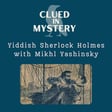
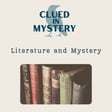
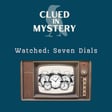
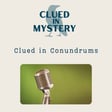
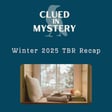
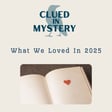
![[Re-release] Anthony Berkeley image](https://media.zencastr.com/cdn-cgi/image/width=112,quality=85/image-files/61e1c276e3ec42007857cff9/e7c778ac-a2ba-4809-9a5c-7cd39d167834.jpg)
![[Bonus] Wake Up Dead Man image](https://media.zencastr.com/cdn-cgi/image/width=112,quality=85/image-files/61e1c276e3ec42007857cff9/e276ac32-e664-464f-956c-7699bdb60aa5.jpg)
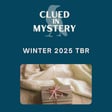
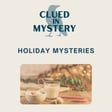
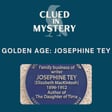
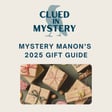
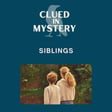

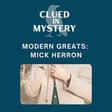
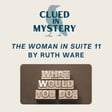
![[Bonus] Read Along: Daughter of Time image](https://media.zencastr.com/cdn-cgi/image/width=112,quality=85/image-files/61e1c276e3ec42007857cff9/b953ad72-c43e-48ca-a18a-b3c216ab90ee.jpg)
